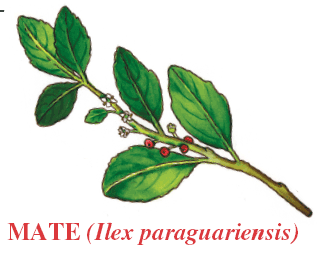Mate (Ilex paraguariensis)
Despite the widespread perception that herbal products are safe because they are “natural,” few of these products have been subjected to rigorous research. The potential risks associated with many herbal dietary supplements remain unknown.
Despite the widespread perception that herbal products are safe because they are “natural,” few of these products have been subjected to rigorous research. The potential risks associated with many herbal dietary supplements remain unknown.
Mate contains bioactive compounds that are responsible for its antioxidant and anticancer effects. Mate tea is heavily promoted for its purported health benefits, but data from epidemiologic studies suggest a strong link between prolonged consumption of mate tea and an increased risk of some cancers.

Controlled clinical trials are needed to determine mate’s safety and efficacy. Until such data are available, patients should use caution. In particular, patients with hypertension, cardiac disorders, or anxiety, and women who are pregnant or breast-feeding should not consume mate.
As reliable information about dietary supplements and “alternative” cancer treatments was not readily available to oncologists who needed it to counsel their patients, the MSKCC Integrative Medicine Service developed and maintains the free “AboutHerbs” website (http://www.mskcc.org/AboutHerbs). This site has two portals, one for oncology professionals and another for the public. With 236 entries (and growing), this continually updated site provides objective information on botanicals, vitamins, other dietary supplements, and unproved cancer therapies.
-Barrie Cassileth, PhD
ALSO KNOWN AS: Yerba mate, St. Bartholomew’s tea, ilex, hervea, guyaki Paraguay tea
BACKGROUND: Mate is a small plant native to South America, where an infusion made of dried mate leaves is widely consumed as a beverage. In the past decade, it has gained popularity in the United States and many other countries as well. Mate is also used in traditional medicine. It is valued for its stimulatory effects and also promoted as a dietary supplement for weight loss, cardiovascular diseases, and cancer prevention. No substantive clinical trials have been conducted to evaluate the efficacy of mate in human
RESEARCH: Mate’s stimulant effects are due to its caffeine, theophylline, and theobromine components.
In vitro studies indicate that mate has cardioprotective effects.[1] Research on its anticancer properties demonstrated proteasome[2] and topoisomerase[3]inhibitory effects. Mate also reduced DNA damage from oxidative stress.[4] However, mate drinks were shown to contain large amounts of carcinogenic compounds, such as polycyclic aromatic hydrocarbons.[5] Moreover, the high temperature of water in which mate is steeped is thought to facilitate solubility and absorption of these substances,[6] which may explain mate’s association with cancer incidence.
Epidemiologic research conducted during the 1990s indicates that chronic mate drinkers are at increased risk of bladder,[7] esophageal,[8] lung,[9] and head and neck cancers.[10] No large clinical studies have been conducted to date.
An herbal formula containing mate was found to delay gastric emptying,[11] but it is not clear that mate alone would exert a similar effect.
HERB-DRUG INTERACTIONS: Diuretics: Mate may cause an additive effect.[12] Chemotherapy: Due to its antioxidant activity, mate may interfere with some chemotherapeutic agents.[4]
ADVERSE REACTIONS: Insomnia, anxiety, tremor, restlessness, agitation, nausea and vomiting, palpitations, and headache.[13,14]
Late Hepatic Recurrence From Granulosa Cell Tumor: A Case Report
Granulosa cell tumors exhibit late recurrence and rare hepatic metastasis, emphasizing the need for lifelong surveillance in affected patients.